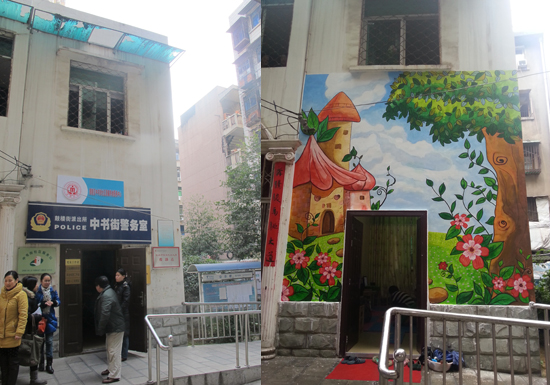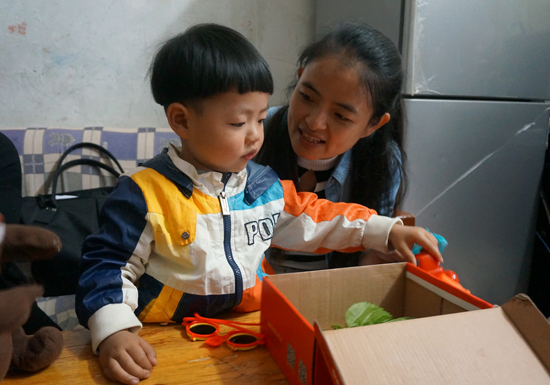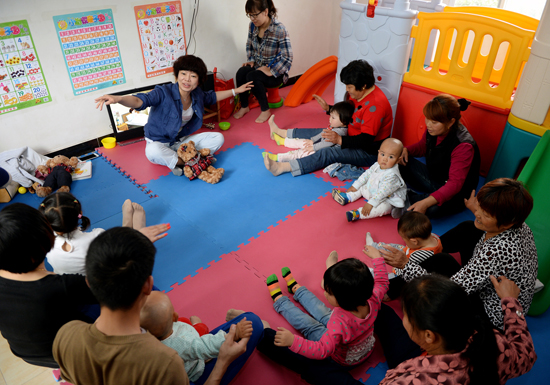By Zhao Qi, Education Officer at UNICEF China
Narrow alleyways were leading me through shabby residential buildings to a shantytown in the centre of Yichang City in Hubei Province. It was part of our determination to reach all children in need, to bring not only some colour to their lives but stimulation, now considered imperative to a child's development.
The people in Zhongshujie community, where a third of residents are migrants, had little to offer. But they had found a room on the floor above a police office where they would set up an early childhood development (ECD) centre through our UNICEF ECD programme. It was not an ideal location because many caregivers in the community are senior citizens who would struggle to carry their grandchildren up the stairs. With help from the local All-China Women's Federation, we managed a swap—the police moved upstairs and the ECD centre took over the ground floor space. In what I thought was an amazing sign of positive things to come, the community members painted a colourful castle on the exterior wall of the building. It was as if they were saying, ”Our children can go to imaginative places, too!”
On my next visit to Zhongshujie months later, I found the centre swarming at its early morning opening with parents, grandparents and children. I watched as several volunteers opened the new-found imaginations further through book reading, music sessions and games. The giggles and shrieks were their own medley of more and more mental doors opening in these young minds.
 ©UNICEF/China/2014/Zhao Qi ©UNICEF/China/2014/Zhao Qi
Comparison photos of Zhongshujie community ECD centre taken in January 2014 (left) and in August 2014 (right) |
One mother, Xiao Zeng, who takes her 3-year-old son, Qiaoqiao, to the centre each day, invited me to their home. It was a small, tattered room with old furniture and stained walls. She and her husband migrated to Yichang City from Fujian Province five years before. They have two boys, the other now two years older than Qiaoqiao. Even though the community ECD centre opened to residents for no fee, Xiao Zeng did not inquire about participating. She presumed her family was not eligible because they did not have the local household registration permit, or hukou. A community official later came to her and made it clear that every child in the community is welcome in the ECD centre. After dropping off her elder son at kindergarten, she and Qiaoqiao run to the centre now. She said it makes them feel included in the community.
She also has learned how to play with her children at home. It is a comment I often hear.
 ©UNICEF/China/2015/Yang Jingjie ©UNICEF/China/2015/Yang Jingjie
Xiao Zeng and her 3-year-old son play at home |
ECD is about the "whole child"—the physical, social, emotional, cognitive thinking and language progression of each young individual. It has far-reaching impact on a child's life, determining their cognitive, emotional and social development, their capacity to learn and their growth. But the benefits are not only for individual children and their families. There are also economic and social returns to society at large.
In China, about 16 million babies are born every year, of which 61 per cent live in rural areas. The vast majority of Chinese children start their lives in an environment with tremendous resource constraints. Up to 2011, only 62 per cent of children aged 3–6 years in China had access to early education, with the enrolment rate in rural areas 30 per cent lower than in urban areas. To reverse this inequality, the Chinese Government released in November 2010 its Opinions about Preschool Education, which outlined the vision to provide universal preschool education to children aged 3–6 years. Following the new policy, the Government of China has been also stepping up its funding support to boost the early education programmes in China's poorer western regions.
In contrast, there has been much less government recognition of or commitment to, ECD services for children aged up to 3 years. There are few affordable or available services or guidance on care for the youngest children.
Xiao Zeng's story reassures us of the difference we can make by directing the resources to the communities most in need.
The UNICEF ECD programme, which helped open the centre in Xiao Zeng's community, is funded by IKEA Foundation's Soft Toy campaign and aims to give every child the best start in life through equitable access to good-quality services. It targets children aged up to 3 years and their families in resource-poor communities. The 40 pilot sites that UNICEF and the All-China Women's Federation have established with IKEA's financial assistance are spread across Hubei, Hunan and Hebei provinces, where there are many children affected by migration. Through the programme, ECD centres located within communities were refurbished to be child-friendly and were fully operational by August 2014.
 ©UNICEF/China/2015/Xia Yong ©UNICEF/China/2015/Xia Yong
At the ECD centre in Aijia village in Hubei Province, a national expert demonstrates to caregivers how to play with young children |
To maximize the reach to needy families who cannot afford to send their children to privately run early child learning centres, the sites were carefully chosen. Some of the communities selected by the local counterparts were relatively well-off thus didn't meet the programme's requirements. Additional work took place to find the most disadvantaged community.
By the end of September 2015, more than 2,000 children aged up to 3 years and their families were benefiting from the ECD programme. Even more promising, the model had been replicated in 10 additional communities by the Hubei provincial government. The Furong district government in Changsha, the capital city of Hunan, is also planning to replicate this model to cover all 66 communities in the district over the next few years, with more than 1 million RMB committed annually for the expansion.
We need government at all levels now to open their imaginations and see that by investing in learning castles for young children and by expanding the ECD programme to as many needy families as possible, everyone's future can change.































